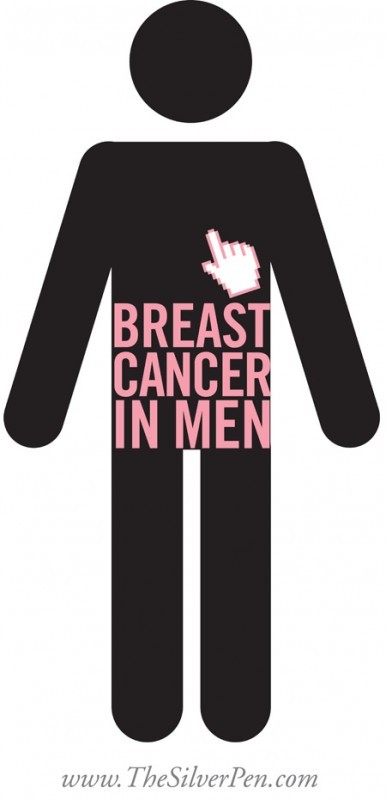Although rare (1 in 100 diagnoses), men can indeed get FBC (f-bomb breast cancer for new readers). Though it’s rare, I’ve known quite a few men with FBC. And you know what? It seems like in some ways, it’s a little extra sucky for them because it’s considered to be a disease that affects women. Several of them have said, “PLEASE do a post for us!” So, this is for you.
Breast cancer is less common in men in part because female hormones (e.g., estrogen) are known to fuel the growth of FBC cells. Around the age of 13 or 14, girls begin to produce estrogen, which is responsible for the development of the “functioning” (i.e., milk producing) aspects of the breasts. At the same time, boys begin developing testosterone, the hormone that suppresses breast growth. But the f-bomb of it is that just like every cell in the body, men’s breast cells can indeed mutate and become cancer.
Common Signs and Symptoms:
- A painless lump beneath the nipple.
- Changes to the skin covering the breast such as dimpling, puckering, redness, or thickening
- Changes to the nipple or a nipple that begins to turn inward
- Bloody or opaque discharge from the nipple
- Weakness and weight loss may occur in advanced cases
Risk Factors:
- Age: breast cancer usually affects older men in their 60’s and 70’s
- Family history of breast cancer
- Radiation exposure to the chest
- High estrogen exposure by medication, obesity, or severe liver disease
- Chronic alcoholism
- A rare genetic condition called Klinefelter’s syndrome
Diagnosis, Treatment, and Prognosis:
- Self examination, physical exam, mammography, and biopsies
- Surgery is the most common initial treatment often followed by chemotherapy, radiation, or hormonal therapy
- Breast cancer is staged the same for men as women
- Prognosis is primarily influenced by tumor stage
Men with breast cancer often receive a diagnosis of a later stage than women, as they are initially less apt to suspect or do anything about any abnormalities in their breasts. This is a big f-bomb in terms of prognosis. Please please please encourage the man in your life to make an appointment with his doctor if he experiences any persistent signs or symptoms of FBC. Early diagnosis is a Silver Lining in this whole mess that is FBC.
Here are some additional resources, if you’d like to learn more:
- American Cancer Society: http://www.cancer.org/cancer/breastcancerinmen/detailedguide/index
- BreastCancer.org: http://www.breastcancer.org/search?utf8=✓&term=breast+cancer+in+men&commit=Search
- National cancer Institute: http://www.cancer.gov/cancertopics/pdq/treatment/malebreast/Patient/page1



Hi,
Thank you so much for posting about breast cancer in men. My dear husband was recently diagnosed with DCIS, Stage 0, and had a mastectomy at the very young age of 42. Our surgeon and Oncologist have both expressed their surprise at his diagnosis at such a young age, but also shared that they're seeing more and more men (of all ages) in their office. My husband is set to start Tamoxifen in a few weeks, and we are both nervous about the side effects.
Thank you for sharing this blog post today. Maybe Valentines Day would be a great day for women to do their own self exam, and check their husbands at the same time!
Thank you so much for writing, Cari. I appreciate it and send my very best wishes to your husband and family. Please stay in touch. Also, I'd love to add any thoughts or reflections that he might have on the experience. Take good care! Hollye